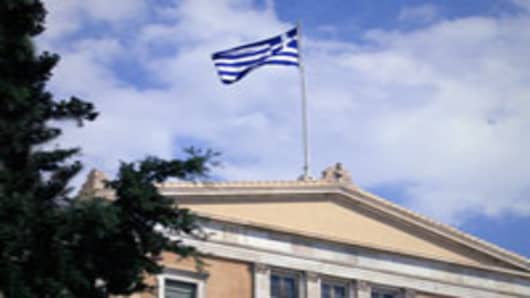Greece says it has all but concluded a crucial dealto write off half its privately-held debt, but the European Central Bank's support is proving a sticking point.
Banking sources and officials in Athens and Brussels said the private sector talks were on the cusp of being concluded, with banks and insurance companies ready to accept around a 70 percent net-present-value loss on the bonds they hold, reducing Greece's debts by around 100 billion euros.
"We are one step — I would say it is a formality — away from finalizing" the debt deal, Finance Minister Evangelos Venizelos told a new conference Tuesday.
Despite the 70 percent scale of the writedown, however, officials said it was unlikely to be sufficient to reduce Greece's debts to 120 percent of GDP by 2020, the goal agreed with the International Monetary Fund to make the debt pile sustainable.
Instead, there is a growing awareness of the need to involve public sector owners of Greek bonds — the European Central Bank and national euro zone central banks — in the restructuring, European officials and bankers said.
"The analysis is being done right now to see what steps the official sector can take in reducing Greece's debts," one EU official familiar with the talks told Reuters.
"The goal is to get the debt-to-GDP down to 120 percent, but even with PSI it's still substantially above that, so there needs to be official sector involvement."
A senior banking source with knowledge of the talks said there was a common understanding that private sector involvement would not work without the official sector taking a hit as well, adding: "We're talking about the 'how' now."
ECB sources told Reuters last week that the ECB had paid 38 billion euros to buy Greek bonds with a face value of 50 billion euros over the past year or more as part of its controversial bond-buying programme to prop up Athens.
That leaves the central bank sitting on a nominal gain of 12 billion euros that could be released back to Athens to help reduce its debt-to-GDP ratio without losses being incurred.
But the EU official said that would still not be enough to close the gap left between the debt relief the private sector is ready to provide and the 120 percent debt-to-GDP target — a gap estimated at nearly 10 percentage points.
Central Banks to Take a Hit?
As a result, it may be necessary for the ECB or national euro zone central banks to take losses on their holdings, or to forego interest payments. Some national central bank balance sheets couldn't handle such losses, the sources said.
"This complicates the discussions," the banker familiar with the talks said of the possibility of national central banks potentially taking losses.
Another source said it might be necessary for one or more of the euro zone's national central banks to raise extra capital to offset the possibility of losses.
At the end of last year, the Dutch central bank cancelled its interim dividend and said it would make a loss in 2011 due to the ECB's bond-buying programme, although the loss was not explicitly linked to the buying of Greek bonds.
The Dutch central bank was not immediately available to comment. A spokesman for the Dutch finance ministry declined to comment.
Even if the private sector's role in reducing Greece's debts is concluded on Wednesday - following nearly seven months of on-and-off talks - it could still take several days before there is any resolution to the official sector participation.
Time is running short. A deal on restructuring Greece's debt is needed by mid-February if Athens is to avoid missing a 14.5 billion euro debt repayment in mid-March, which will force a default.


